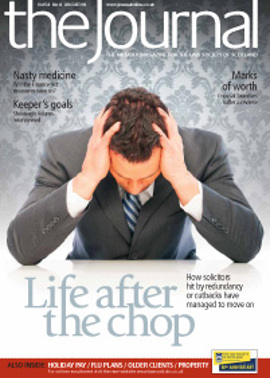Honest talking

It was not the most elegant form of words: “Law Page New Today”. The top right-hand corner on page one (of the then broadsheet Scotsman) continued: “Our weekly legal forum, page 12”.
In the history of newspapers, it will not go down as a hugely significant development, but at the time, in Scotland, it mattered.
It was a modest beginning. There was, on a single broadsheet page, a feature on that hoary old chestnut, corporate killing, and a smaller story on drug courts. As I recall, that one proved slightly flaky.
The page was completed by media lawyer Campbell Deane writing about a stooshie involving the Daily Record and Celtic – and a new column called “In Chambers”. This later morphed into “Court Shorts”, which I thought was funnier.
It was Tuesday 20 May 2003 and the Scotsman’s first foray into professional pages, a genuine attempt to build bridges with those professions that had been battered by the paper under Andrew Neil’s long-distance stewardship.
I have described the relationship between the Scotsman and the Law Society of Scotland in the years around the turn of the millennium as similar to that between dog and lamp post. Under Mr Neil, the paper was always ready to lift its leg, whether it needed to or not.
It was nothing personal against the Society, or even lawyers; the paper hated pretty much all the professional classes. Civil servants? Time-serving bureaucrats drinking coffee at public expense. Teachers? A union-dominated profession defending its members’ interests at the cost of children’s education. Doctors? Fewer unsociable hours, more cash.
Some Scotsman journalists at the time were almost constantly at war with the Society. The Society had its faults, but the paper let itself down by constant – and sometimes ill informed – attacks. Relations hit a low barely a year before the specialist pages were launched.
Under the editorship of Iain Martin (bravely, with Mr Neil still at the helm) and later John McGurk, there was a genuine attempt to engage with the profession. There were many mistakes along the way. When I was put in charge of the pages, I knew precious little about law – and it was a steep learning curve.
Just weeks after the pages were launched, we carried out a survey of lawyers to find what they thought about the big issues of the moment. It concentrated almost solely on criminal law and many emailed back to say it was largely irrelevant to their professional life.
To compensate for this, I tried to build relationships with legal firms and the pages started to take some kind of shape. At the time, the Herald had a law and accountancy page, but the first-person pieces almost always carried an accountants’ byline. We tried to take advantage by running “forum” pieces, allowing lawyers to write on the key legal matters of the day.
Again, I didn’t handle this terribly well and there were too many “puff” pieces in the early days, with some lawyers (supported by smart PRs or switched-on marketing teams) taking the chance to big up themselves and their expertise rather than delving into the big issues.
There were times it seemed the legal coverage would end, and at one point it receded to a half page in the broadsheet, then barely a single page after the move to compact. However, it refused to die and with the arrival of intelligent and informed freelance writers like Jenni Veitch and later John Forsyth, it gathered new momentum. We were getting interviews with all the big players and covering the important issues in some depth.
Through a lot of work behind the scenes, we had built a mature relationship with the Society and were able to work together in a constructive way. The mistrust of the past gave way to a grown-up and sensible discourse. There were, and still are, spats along the way, as there must be. Yet the key is open debate, on the pages of the paper and beyond.
I was delighted to be asked to chair a session on alternative business structures at this year’s Law Society of Scotland conference, and tried my best to pin down all panellists – including the Society’s new Chief Executive Lorna Jack – to avoid waffle and obfuscation.
I would like to think that our pages have moved away from the puffery of the past. Lawyers must have something relevant to say, and say it in a meaningful, but not a tedious and legalistic way.
Last month I left the Scotsman after nine years – more than six of them spent editing the legal pages (in addition to many other responsibilities!). In that time, I think we have made some terrific progress with the profession and I hope this can continue. However, there are big issues ahead and the dog reserves its right to cock its leg – but only at appropriate times.
In this issue
- Planning's big day
- Hair alcohol tests: tackling the root of the problem
- Ask not...
- Trainee recruitment must be more open
- Honest talking
- Out, but not down
- A budget to save the world?
- Uncertain rights
- Copycats: nine lives used up?
- A break from illness?
- On the record
- From the Brussels Office
- Member support: the next level
- Legal practice reinvented
- Beat the pandemic
- Ask Ash
- A vintage problem?
- Final is still final
- Blacklisting blacklists
- A better fitting kilt
- Proper restraint
- Scottish Solicitors' Discipline Tribunal
- Website review
- Book reviews
- Knowledge rules OK?
- Lifting the stones
- Legitimate finding or mortgage fraud?
- Islamic finance: a Scottish lead?
- Environmental Law Centre: taking issues






